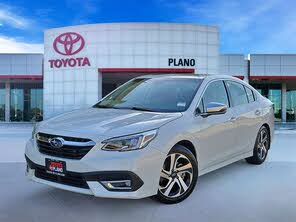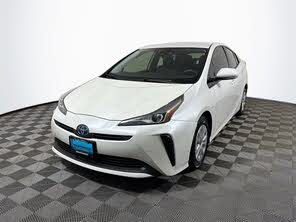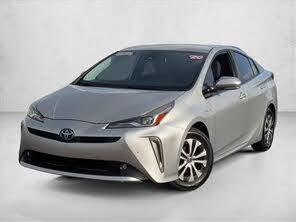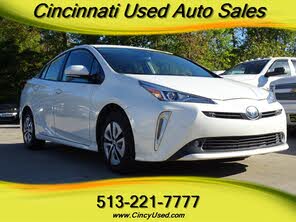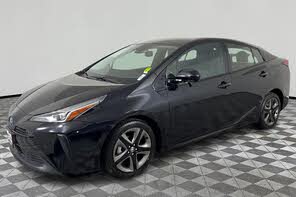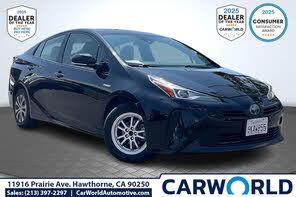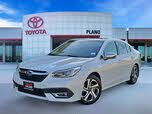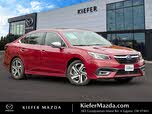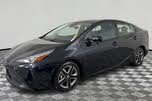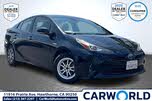2021 Subaru Legacy vs 2020 Toyota Prius
Overview | |
MSRP$24,325 | MSRP$22,895 |
Listings112 | Listings158 |
Ratings & Reviews | |
User Reviews | User Reviews |
Expert reviews7.5 out of 10 | Expert reviews8.3 out of 10 |
Pros
Cons
| Pros
Cons
|
2020 Toyota Prius Reviews SummaryEver heard of an eponym? It’s a brand or product that is so popular that it’s come to define its respective market. Think of Kleenex for tissues or Band-Aid for medical bandages. For hybrids, the Toyota Prius has ascended to near-eponym status. It was one of the first—and remains one of the most popular—hybrids ever made. As automakers across the industry are rolling out more hybrid models, the Prius continues to be the standard-bearer of this genre. This is largely due to the fact that the Prius is a dedicated hybrid, rather than a hybrid variant of an existing model. Throughout the industry, different companies are taking different approaches to alt-fuel vehicles, including full-electric and hydrogen fuel cell powertrains. The Prius endures as the leader in hybrid power due to a focus on fuel efficiency that doesn’t compromise on style, drivability, and versatility. So how does the Prius hold its ground as more players enter the fray? Read on to find out. | |
2021 Subaru Legacy Reviews SummaryThe Subaru Legacy delivers a lot of what the typical Subaru customer is looking for, including standard all-wheel drive (AWD)—it's the only vehicle in its class to offer that. It is also fuel-efficient, has comfortable seats, and ranks as one of the safest vehicles on the market today. But, fit-and-finish questions linger, and the EyeSight safety technology can prove annoying, with frequent beeps and chimes. | |
No video found | No video found |
Popular Features & Specs | |
Engine1.8L 121 hp I4 Hybrid | Engine2.5L 182 hp H4 |
Drive TrainFWD | Drive TrainAWD |
Seating Capacity5 | Seating Capacity5 |
Horsepower | Horsepower182 hp @ 5800 rpm |
EV Battery Capacity0.7 kWh | EV Battery Capacity |
MPG City58 | MPG City27 |
MPG Highway53 | MPG Highway35 |
Engine | |
Engine Name1.8L 121 hp I4 Hybrid | Engine Name2.5L 182 hp H4 |
Torque | Torque178 lb-ft @ 4400 rpm |
Horsepower | Horsepower182 hp @ 5800 rpm |
DrivetrainFWD | DrivetrainAWD |
Fuel Economy | |
EV Battery Capacity0.7 kWh | EV Battery Capacity |
MPG City58 | MPG City27 |
MPG Highway53 | MPG Highway35 |
Interior | |
Seating Capacity5 | Seating Capacity5 |
Safety | |
Front Crash Overall4 | Front Crash Overall5 |
Side Crash Overall5 | Side Crash Overall5 |
Dimensions & Capacity | |
Cargo Space27.4 cu ft | Cargo Space15.1 cu ft |
Curb Weight3010 lbs | Curb Weight3499 lbs |
Height57.9 in | Height59.1 in |
Length180.0 in | Length190.6 in |
Width69.3 in | Width82.0 in |
Wheelbase106.3 in | Wheelbase108.3 in |
Maximum Payload825 lbs | Maximum Payload |
Number of doors4 | Number of doors4 |
Overview | ||
MSRP | $24,325 | $22,895 |
Listings | ||
Ratings & Reviews | ||
User reviews | ||
Expert reviews | 7.5 out of 10Read full review | 8.3 out of 10Read full review |
Pros & cons | Pros
Cons
| Pros
Cons
|
Summary | Ever heard of an eponym? It’s a brand or product that is so popular that it’s come to define its respective market. Think of Kleenex for tissues or Band-Aid for medical bandages. For hybrids, the Toyota Prius has ascended to near-eponym status. It was one of the first—and remains one of the most popular—hybrids ever made. As automakers across the industry are rolling out more hybrid models, the Prius continues to be the standard-bearer of this genre. This is largely due to the fact that the Prius is a dedicated hybrid, rather than a hybrid variant of an existing model. Throughout the industry, different companies are taking different approaches to alt-fuel vehicles, including full-electric and hydrogen fuel cell powertrains. The Prius endures as the leader in hybrid power due to a focus on fuel efficiency that doesn’t compromise on style, drivability, and versatility. So how does the Prius hold its ground as more players enter the fray? Read on to find out. | The Subaru Legacy delivers a lot of what the typical Subaru customer is looking for, including standard all-wheel drive (AWD)—it's the only vehicle in its class to offer that. It is also fuel-efficient, has comfortable seats, and ranks as one of the safest vehicles on the market today. But, fit-and-finish questions linger, and the EyeSight safety technology can prove annoying, with frequent beeps and chimes. |
Video | No video found | No video found |
Popular Features & Specs | ||
Engine | 1.8L 121 hp I4 Hybrid | 2.5L 182 hp H4 |
Drive Train | FWD | AWD |
Seating Capacity | 5 | 5 |
Horsepower | 182 hp @ 5800 rpm | |
EV Battery Capacity | 0.7 kWh | |
MPG City | 58 | 27 |
MPG Highway | 53 | 35 |
Engine | ||
Engine Name | 1.8L 121 hp I4 Hybrid | 2.5L 182 hp H4 |
Torque | 178 lb-ft @ 4400 rpm | |
Horsepower | 182 hp @ 5800 rpm | |
Drivetrain | FWD | AWD |
Fuel Economy | ||
EV Battery Capacity | 0.7 kWh | |
MPG City | 58 | 27 |
MPG Highway | 53 | 35 |
Interior | ||
Seating Capacity | 5 | 5 |
Safety | ||
Front Crash Overall | 4 | 5 |
Side Crash Overall | 5 | 5 |
Dimensions & Capacity | ||
Cargo Space | 27.4 cu ft | 15.1 cu ft |
Curb Weight | 3010 lbs | 3499 lbs |
Height | 57.9 in | 59.1 in |
Length | 180.0 in | 190.6 in |
Width | 69.3 in | 82.0 in |
Wheelbase | 106.3 in | 108.3 in |
Maximum Payload | 825 lbs | |
Number of doors | 4 | 4 |
The 2020 Toyota Prius maintained its iconic jellybean-like shape, a design optimized for aerodynamics. Over the years, Toyota refined the styling within these constraints, giving the current generation a more sedan-like appearance while retaining its hatchback functionality. The Prius's futuristic style remained contemporary, with a cabin defined by its central instrumentation and gauges, a hallmark since its inception over two decades ago. Trim levels ranged from the entry-level L Eco to the range-topping Limited, each offering a variety of features from basic connectivity to advanced driver-assistance systems.
In contrast, the 2021 Subaru Legacy, a midsize sedan, shared much of its design and mechanics with the Subaru Outback wagon. The Legacy's styling was more subdued, focusing on safety and reliability rather than eye-catching aesthetics. It featured high-gloss stainless steel moldings and a sleeker design compared to its predecessor. Standard 17-inch steel wheels could be upgraded to alloy or machine-finished options. The Legacy also offered power-folding mirrors, a power moonroof, and an All-Weather Package, enhancing its practicality and comfort.

















The 2020 Toyota Prius was powered by a 1.8-liter four-cylinder engine paired with an electric motor, producing a combined 121 horsepower and 105 pound-feet of torque. It offered both front-wheel drive (FWD) and an all-wheel-drive (AWD) variant, the latter using a second electric motor for the rear wheels. The Prius featured three drive modes—EV, Eco, and Power—each catering to different driving needs. Its unique shifter design and low center of gravity contributed to a smooth and engaging driving experience, ideal for daily commutes.
The 2021 Subaru Legacy offered two engine options: a 2.5-liter four-cylinder engine with 182 horsepower and 176 pound-feet of torque, and a turbocharged 2.4-liter engine in the Limited XT and Touring XT trims, delivering 260 horsepower and 277 pound-feet of torque. Both engines were paired with a continuously variable transmission (CVT). The Legacy's standard all-wheel drive provided excellent traction and stability, especially on rough terrain. However, its steering could be challenging at highway speeds without lane-centering technology activated. Fuel economy was commendable, with the base engine achieving up to 35 mpg on the highway.
The 2020 Toyota Prius made efficient use of its compact platform, offering spacious and comfortable front seats with ample headroom and legroom. The rear seats were also roomy, though taller passengers needed to be cautious when entering and exiting. The Prius excelled in cargo space, providing 50.7 cubic feet with the rear seats folded and up to 27.4 cubic feet with the seats up, making it one of the most versatile hybrids available.
The 2021 Subaru Legacy focused on comfort, featuring a sound-insulation windshield and improved seat positioning. The Legacy offered a 10-way power-adjustable driver’s seat in all trims except the base model, which had manually adjustable seats. The rear seats provided ample legroom, making long journeys comfortable for adult passengers. However, the Legacy's trunk space was limited to 15.1 cubic feet, a trade-off for the generous passenger space.
The 2020 Toyota Prius came standard with a 7-inch touchscreen infotainment system, offering Android Auto, Apple CarPlay, Bluetooth connectivity, a WiFi hotspot, and three USB ports. The Limited trim upgraded to an 11.6-inch screen with a customizable layout, though it lacked Android Auto support. The Prius also featured a top-center instrument panel displaying hybrid drivetrain status and other critical information, with an available head-up display (HUD) for added convenience.
The 2021 Subaru Legacy featured dual 7-inch displays in the base model, while higher trims boasted an 11.6-inch infotainment screen. Standard features included Apple CarPlay, Android Auto, multiple USB ports, and automatic climate control. Higher trims added navigation, a Harman Kardon premium audio system, and additional power outlets. Despite its functionality, the Legacy's infotainment screen had a less sophisticated appearance, with a multicolored background that didn't match the vehicle's overall elegance.
The 2020 Toyota Prius was equipped with Toyota Safety Sense 2.0, including automatic emergency braking, forward-collision warning, lane-departure warning, adaptive cruise control, and automatic high beams. Optional features included blind-spot monitoring, rear cross-traffic alert, and active park assist. The Prius earned a five-star rating from the NHTSA and a "Top Safety Pick" from the IIHS, though it fell short of the highest rating due to average scores in certain tests.
The 2021 Subaru Legacy excelled in safety, earning top scores from the IIHS and a five-star overall rating from the NHTSA. Standard Subaru EyeSight technology included adaptive cruise control, pre-collision automatic emergency braking, lane departure warning, and a head-up display. Additional safety features like reverse automatic braking and blind-spot monitoring were available. The Legacy's safety system was comprehensive, though some users found the alerts overly sensitive.
CarGurus highlights

According to CarGurus experts, the overall rating for the 2020 Toyota Prius is 7.5 out of 10, while the 2021 Subaru Legacy scores 8.3 out of 10. Based on these ratings, the 2021 Subaru Legacy is the recommended choice, offering superior safety, comfort, and standard all-wheel drive.
Choose the 2021 Subaru Legacy if:
- You want standard all-wheel drive for better traction and stability.
- You seek a comfortable and spacious interior for long journeys.
- You prioritize top-tier safety features and ratings.
Choose the 2020 Toyota Prius if:
- You prioritize fuel efficiency and hybrid technology.
- You need ample cargo space and a versatile hatchback design.
- You value a futuristic design with a central instrument panel.
CarGurus highlights

According to CarGurus experts, the overall rating for the 2020 Toyota Prius is 7.5 out of 10, while the 2021 Subaru Legacy scores 8.3 out of 10. Based on these ratings, the 2021 Subaru Legacy is the recommended choice, offering superior safety, comfort, and standard all-wheel drive.
Choose the 2021 Subaru Legacy if:
Shop Now- You want standard all-wheel drive for better traction and stability.
- You seek a comfortable and spacious interior for long journeys.
- You prioritize top-tier safety features and ratings.
Choose the 2020 Toyota Prius if:
Shop Now- You prioritize fuel efficiency and hybrid technology.
- You need ample cargo space and a versatile hatchback design.
- You value a futuristic design with a central instrument panel.

By: CarGurus + AI
At CarGurus, our team of experienced automotive writers remain at the heart of our content operation, conducting hands-on car tests and writing insightful guides that are backed by years of industry experience. To complement this, we are harnessing AI to make our content offering more diverse and more helpful to shoppers than ever. To achieve this, our AI systems are based exclusively on CarGurus content, ratings and data, so that what we produce is both unique to CarGurus, and uniquely helpful to car shoppers.




